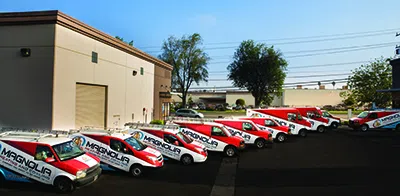Managing and maintaining a fleet of vehicles for your business may seem like a lot of hassle considering the initial costs of establishing the fleet, routine maintenance, parts replacement, and all the other aspects. However, a small investment in your fleet limits your liability, ensures that your drivers are safe, and that deliveries and service calls are made effectively and efficiently. Here are just a few of the advantages of fleet management for small business owners.
1. You own the car or truck.
Many companies allow employees to use their personal vehicles for work purposes and reimburse them accordingly. While this is a nice gesture and may seem simpler than buying a fleet of cars and trucks, it is lacking in several areas. First, with a company-owned fleet of cars and/or trucks, all vehicles display your company’s branding uniformly, making your business look extremely professional. Second, a company-owned fleet has uniformity in make and model of the vehicles too. As a result, you know the gas mileage and maintenance schedule for each vehicle. Third, owning the fleet allows you to be certain the vehicles are properly insured, up-todate on inspections, and appropriate for the job requirements. By owning the fleet, you limit your liability.
2. You know the costs in advance.
With ownership and good fleet management, you know the cost of maintaining each vehicle and can budget for those expenses. Unfortunately, if employees use their vehicles for business purposes, some of their personal gas and maintenance expenses may forward to the company.
3. You decide which vehicles stay and which go.
Part of good fleet management is determining which vehicles are too costly and which are worthwhile investments. Gas-guzzlers and other problem vehicles can be traded or scrapped, allowing you to retain only the best parts of the fleet. You are also able to decide where and when vehicles are sold, so you trade in or sell into a competitive market, thereby getting back some of your investment.
4. You match vehicles to their purpose.
Each business requires a different set of vehicles. Salespeople do not need SUVs, and most repair companies do not benefit from purchasing small sedans. When you own a fleet, you select the vehicle type that makes the most sense for your business and equip it accordingly. This allows you to factor in gas mileage, size, repairs, and other vehicle characteristics so that the vehicle your employee drives is appropriate. Buying a fleet also enables you to create business relationships with vehicle retailers. As such, you may be able to buy in bulk, or negotiate a discount on maintenance. Establishing such a relationship means that when upgrades or tradeins are necessary, your dealer already knows your company requirements and can best advise you.
5. You set the standards.
Everyone drives differently. Some drivers are aggressive, some are passive, and some are unfocused. When you own and manage a fleet of vehicles, you control what goes on behind the wheel. Whether you install GPS tracking systems to monitor your drivers, or set up a check-in/checkout system for using the company’s vehicles, you ensure that the drivers you put behind the wheel follow your rules and maintain driving excellence.
Robert J. Hall is president of Track Your Truck, a leader in vehicle GPS tracking systems and software for small and midsized companies.




